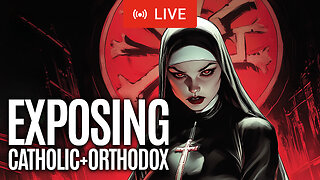Premium Only Content

Repentance & Faith Without Works | Christian Bible Study
https://linktr.ee/thechristianking
There is a significant debate within Christian theology regarding the relationship between repentance, faith, and works, particularly in the context of salvation. This debate has deep roots in the history of Christian thought, with different traditions offering varying interpretations of how these elements interact.
During the Protestant Reformation, the doctrine of Sola Fide ("faith alone") became a central tenet, especially as articulated by Martin Luther. This doctrine holds that salvation is achieved through faith alone, independent of works. According to this view, both repentance and faith are essential to justification before God, but works do not contribute to one's salvation. Instead, works are seen as the natural evidence of genuine faith. This perspective draws on passages like Ephesians 2:8-9, which emphasizes that salvation is a gift from God and not the result of human efforts, and Romans 3:28, which states that justification comes through faith apart from works of the law. In this view, while good works naturally flow from true faith, they do not play a role in securing salvation.
In contrast, the Roman Catholic and Eastern Orthodox traditions emphasize that faith and works are both integral to salvation. These traditions argue that faith must be accompanied by works, which are seen as part of a cooperative effort between God's grace and human response. They often cite James 2:24, which states that a person is justified by works and not by faith alone, and Matthew 7:21, where Jesus says that only those who do the will of the Father will enter the kingdom of heaven. From this perspective, works are not merely evidence of faith but are necessary for maintaining or achieving salvation. Repentance, in this view, is an ongoing process, and faith is understood as something that must be lived out through actions, often involving participation in the sacraments and the life of the Church.
The debate extends to the nature of repentance and its relationship to faith. Some theologians argue that repentance is an integral part of faith, involving a turning away from sin and toward God, while others see it as a distinct yet necessary act that accompanies faith. Furthermore, the question of whether works are simply the evidence of true faith or a requirement for salvation is a point of contention, particularly in how one interprets passages like those found in James 2, where faith without works is described as dead.
In summary, the debate over repentance, faith, and works revolves around how these elements contribute to salvation and how they are interrelated. The Protestant position emphasizes faith alone, with works as evidence of that faith, while Catholic and Orthodox traditions view works as a necessary component of salvation alongside faith and ongoing repentance. This theological divergence has led to significant differences in how salvation is understood and practiced across various Christian traditions.
#FaithAlone #RepentanceAndFaith #SalvationDebate #SolaFide #FaithAndWorks #ChristianTheology #ProtestantReformation #CatholicDoctrine #OrthodoxTradition #Justification #BiblicalInterpretation #GospelTruth #EternalSalvation
-
 6:44:12
6:44:12
TheChristianKingTV
3 days agoExposing the Roman Catholic & Orthodox Church | #catholic #orthodox #church
2332 -
 1:33:49
1:33:49
Game On!
14 hours ago $2.33 earnedNotre Dame BATTLES Penn State for a trip to national title game!
28.8K2 -
 17:21
17:21
China Uncensored
13 hours agoYouTube Censorship Is Destroying China Uncensored
39.1K75 -
 12:10
12:10
MichaelBisping
1 day agoBISPING: "UFC is BACK and STACKED!" | UFC 311 / UFC 312 (2025 BREAKDOWN)
49.4K4 -
 15:38
15:38
Misha Petrov
20 hours agoKim Kardashian’s DISTURBING "Santa Baby" Music Video
39.8K28 -
 23:28
23:28
Degenerate Jay
1 day ago $1.62 earnedStar Ocean - The RPG Series That Deserves Better
23.7K2 -
 1:04:51
1:04:51
State of the Second Podcast
17 hours agoCarrying on Campus: Rights or Risks? (ft. Cheryl Todd)
33.8K2 -
 21:09
21:09
Dr David Jockers
22 hours ago $1.60 earnedAutophagy Fasting: What Happens to Your Body + Best Autophagy Enhancers
28.6K2 -
 2:31
2:31
BIG NEM
13 hours agoCOMPLETE EMASCULATION: His Relationship is TOAST!
39.9K1 -
 3:11:17
3:11:17
FreshandFit
11 hours agoRed Flags In American vs Foreign Girls
115K75